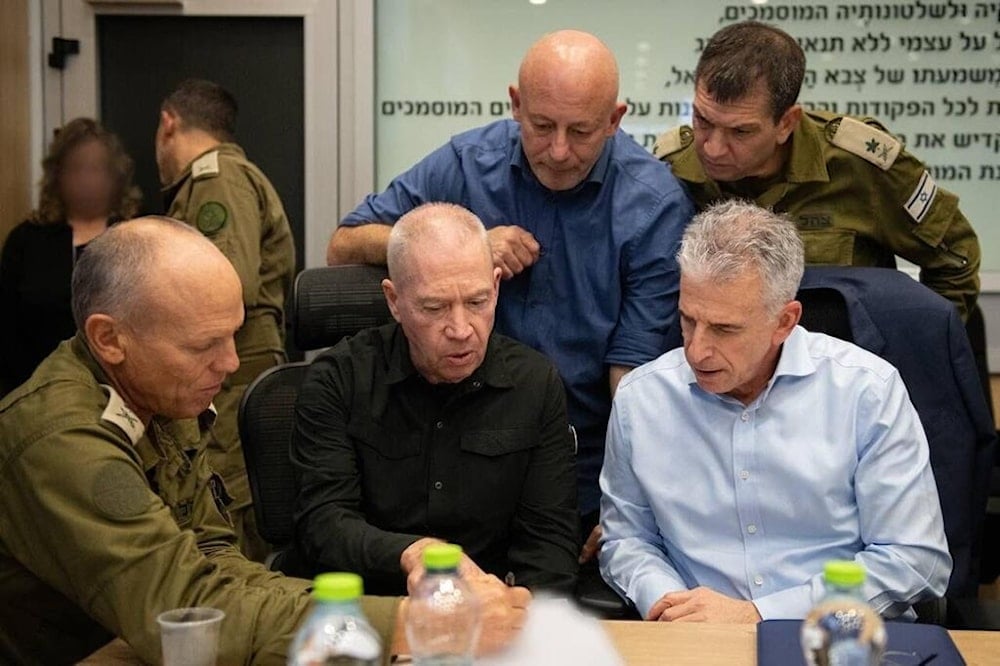'Israel' can't fully destroy Hezbollah, political deal needed: Gallant
The Israeli Security Minister says the return of the northern residents of Gaza to their areas will not be linked to the release of the captives held by the Resistance in the third stage of the war on the Strip.
-

Israeli Minister Yoav Gallant seen with Mossad director David Barnea as part of the war cabinet on November 19, 2023 (AFP)
Israeli Security Minister Yoav Gallant said on Monday that the Israeli occupation entity must reach a "political settlement" regarding the situation with Hezbollah because it is unable to "completely destroy" the Resistance party.
Elsewhere in his statement, Gallant said the entity will not link the return of the residents in Gaza to the northern part of the Strip with the transitioning to the third stage of the war, stating, "There will be another plan" for the return of the captives and "linking matters together is not correct."
A military commentator on the Israeli Kan news channel, Roi Sharon, said today that if "Israel" engages in an intensive operation against Hezbollah's elite Radwan Force, it is more likely to lead to a comprehensive war.
Sharon stressed that "Israel" should take action to eliminate the elite forces' threat and keep it eight kilometers away from the borders without getting into a full-scale war but expressed uncertainty about the availability of technology to achieve this task.
"That's why Blinken was here last week, and Hochtstein was here. The goal is to reach an agreement and avert the war phase. It's not certain that this is possible, but there is some optimism. In the end, to allow the residents of the north [occupied Palestine] to return, a solution must be found to the Radwan threat so that they [settlers] in Hanita don't wake up one day" to the same experience of "Nahel Oz" settlers, in reference to Operation Al-Aqsa Flood.
A difficult position
In an "initial response" to the Israeli assassination of Hamas' senior Resistance leader Sheikh Saleh al-Arouri and his comrades in an airstrike on Beirut's Southern Suburb last week, Hezbollah targeted the Israeli army's "Meron" air control and surveillance base in northern occupied Palestine.
The base, which was struck last Saturday with 62 guided missiles and rockets, is considered the occupation entity's most vital and critical headquarters in northern occupied Palestine.
It is responsible for commanding, coordinating, and organizing all aerial operations toward Syria, Lebanon, Turkey, Cyprus, and the northern part of the Eastern Mediterranean basin. This includes cyber warfare, spying, and operating Israeli air and drone strikes. Additionally, it hosts top Israeli generals, elite units, and highly specialized officers.
Commenting on the operation, Israeli military analyst Amos Harel criticized the situation the occupation entity is in currently. He pointed out that after three months of border operations conducted by Hezbollah, which led to the evacuation of tens of thousands of northern settlers, "Israel" still finds itself in a position where the Resistance is able to strike a highly sensitive target.
Voicing similar concerns, Israeli Walla! news website said last week that Hezbollah's attack on "Meron" was only a "trailer" of what would happen if the party's "multidimensional threats expand."
"The heavy salvo this morning is a trailer of the war situation, during which Hezbollah elements will launch thousands of rockets, focusing on strategic and sensitive locations, such as national infrastructure, military bases, and symbols of authority," the outlet said.

 3 Min Read
3 Min Read








